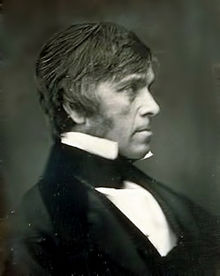Among the many books I plan to write is one titled
Technology Drives Everything. I may stick (Almost) between Drives and Everything, for I'm sure some matters of the heart still move regardless of how technology does.
Technology rose up this week, yesterday and today, in a good way. I must digress first and set the scene. As I've written before I am an occasional student of the life and writing of Thomas Carlyle, English author, philosopher, and prophet. I can't for sure remember how I was drawing into his circle, but probably from books in my possession passed down from Uncle David Sexton to my mom to my dad and now to me. A couple of them were by Carlyle, and for a while I picked up some more from used book sources.
Every now and then I leave the writing route I should be on and follow Carlyle down various forest paths, finding a work, reading a few paragraphs, downloading it (if available to do so), finding a reference, downloading that. Sidelines Syndrome always compels me, however, to do more than read Carlyle or about Carlyle, and so I must write about him. The engineer in me wants things to be organized; hence I'm working on a bibliography of Carlyle's writings based on the date of composition rather than the date of publication. For me the composition is more critical than the publication date, though the latter is of interest as well.
In this pursuit I first came across some website that had various Carlyle compositions listed. I blended these into one typed document. Slowly I learned of more, and added them. I discovered some older bibliographies that were available for download from Google books, downloaded them, and continued to expand the blended bibliography. I learned that everyone seemed to be most interested in the chronology of publication, not of composition.
But let me stop a moment. I
downloaded those bibliographies, and had them immediately available. What an incredible convenience, and boon to research. Using my current research subject as an example of the old way, on 3 November 1825, Carlyle wrote to William Tait, a London publisher, and told him about books he needed for his project for Tait to translate German novelists into English. After discussing the German writers and which of their works he wished to translate, Carlyle got down to the need of having copies.
If I had these books ready by me, I should reckon the undertaking half completed. Perhaps it may not be so difficult to obtain at least a perusal of them. Most, nay all of them, are marketable works, and I could read, without injuring , them. By your commercial connexions I trust you may be able to procure me the greater part of them: I shall expect your tidings on the subject soon....
He referred to an earlier letter, to a different colleague, who he wanted to procure books in Germany and ship them to him.
One work about Carlyle that I saw references on at several places is
Sartor Called Resartus, by G.B. Tennyson. Published in 1966, it is still under copyright protection and hence not available for viewing on the Internet. Checking my usual places for purchasing books, I found it could be had for about $20 plus shipping, a little more than I wanted to pay at the moment. Inter-library loan costs $2.00 per book, whether they can get it or not. But would such a book as this, not exactly mainstream for scholars and readers, even be available through ILL?
I was looking somewhere for this book on line when I noticed a button for checking the book out in WorldCat. I keep forgetting that this service is out there. It's a joint catalog of many, many libraries. I don't know if it's limited to the libraries of academia, or if it includes public libraries. Through this I learned that the University of Arkansas library in Fayetteville, 25 miles down the road, had a copy. Except I have no relationship and no privileges there, and the cost of a 50 mile round trip was about equal to purchasing the book.
Expanding my search I found it in other places where I might go sometime or where I have friend, including the Stephen F. Austin University library in Nacogdoches Texas. A writing colleague in nearby Lufkin graduated from there. But I soon found it was as far for her to drive as it would be for me to go to Fayetteville.
Then I thought of my alma mater, the University of Rhode Island in Kingston. In the WorldCat I searched for libraries close to my old area code. URI popped up as having the book. Given that URI is 1,400 or so miles away, I thought of my friend Gary who works there. Taking a chance, I e-mailed him Tuesday morning to see if he had library privileges and if he would undertake getting me copies of certain pages from the book. Three e-mails later and the book was checked-out, the pages scanned, and an e-mail brought them to me in Bentonville Arkansas. Reading those pages caused me to realize I could use some others, and those were in my inbox the next morning.
What an incredible convenience this is! The very thing that Carlyle wrote several letters on, obtaining resources for his writing, I was able to work through in a matter of four hours. Yes, it took correspondence with a couple of friends to make it happen. That part was the same as for Carlyle. But the communications went two ways in minutes, and the needed work was procured in a few hours, whereas for Carlyle it took months for exchanging correspondence, finding books to borrow to avoid expensive purchases, waiting for those books to be shipped, etc.
Technology is an incredible thing. I'm glad to be living in this era.



